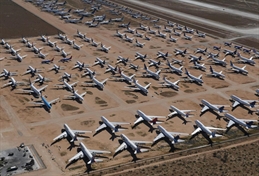
Global aviation data firm, Cirium, has released its latest Airline Insights Review 2020 which detailed the impact on aviation of worldwide travel restrictions due to COVID-19.
It said the coronavirus pandemic wiped out 21 years of global passenger traffic growth in a matter of months, reducing traffic this year to levels last seen in 1999. In comparison to last year, passenger traffic is estimated to be down 67% in 2020.
"At the peak of the disruption in April, scheduled passenger flights dropped significantly to just 13,600 globally on April 25, compared to the year’s busiest day on January 3 when Cirium tracked over 95,000 scheduled passenger flights globally. This marks an extraordinary 86% reduction in flights," Cirium said.
Fleets in storage (but not the A320)
Domestic travel was down 40% this year, from 21.5 million flights in 2019, while international flights suffered an even more precipitous drop as they were 68% below the 11.7 million flights tracked the year before.
“This severe setback shows the true extent of the challenge faced by the struggling aviation sector as it has sought to reset itself in the new post COVID-19 era,” said Jeremy Bowen, CEO of Cirium.
From January to December airlines operated 49% fewer flights in 2020 compared to 2019 – down from 33.2 million flights to just 16.8 million (to December 20).
Cirium noted that as airlines have been forced to drastically reduce the number of aircraft still in service, those still flying are operating significantly fewer hours.
For example, it said narrowbody aircraft operated just six to seven hours a day in Q3 2020 compared to nine to 10 hours a day in the same period last year.
"While up to 30% of the global passenger fleet remains in storage there are signs of recovery on the horizon," the global aviation data firm said, noting that with only 10% of short-haul Airbus A320neo aircraft currently in storage – it shows that "narrowbody aircraft" will be leading the recovery and domestic and short-haul travel returning first.
With domestic and short-haul services ruling the day, the world’s most used aircraft type was the Airbus A320 with Cirium tracking 5.49 million flights throughout 2020.
Trends this year: consolidation, more efficient planes, plane leasing
Cirium identified some trends which it expects to see in the airline industry this year. This includes the consolidation of airlines, particularly in Asia-Pacific where more domestic competitors will merge or be acquired; the use of new-generation aircraft like the A320neo and the return of the 737 Max, providing reduced operating costs; surplus aircraft retiring and the Boeing 747 and the Airbus A380 are projected to support the rising demand in the denser leisure markets.
It said for 2021, airlines will also need to deploy more dynamic scheduling with the increased volatility of flight scheduling, as the booking window has fallen from six- to 12-months to just six- to eight-weeks; and the implementation of AI technology will accelerate to automate the traveler experience and real-time proactive information will become more critical.
Cirium said aircraft leasing will push past 50% becoming the major manner in which aircraft are financed.
“Airlines will have a way before returning to 2019 levels particularly as international travel is significantly down and showing only slow signs of recovery, mainly China and Southeast Asia,” Jeremy Bowen said.
“But Cirium is confident aviation will weather this difficult and terrible year and emerge in better shape – with younger more fuel-efficient aircraft and right-sized fleets – to gradually navigate their way to recovery in the years ahead,” he added.



